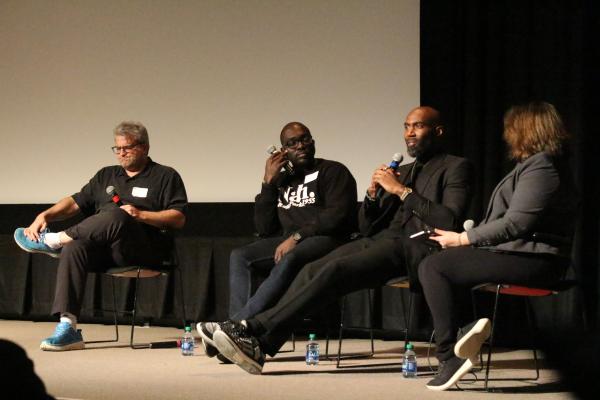SSI, EHE screen Zirin’s “Behind the Shield: The Power & Politics of the NFL”

By Greg Wilson
SSI was privileged to screen the movie “Behind the Shield: The Power & Politics of the NFL,” which deals with the reality of politics in the NFL at the Wexner Center for the Arts on Tuesday, in conjunction with the celebration of the life and work of Dr. Martin Luther King Jr.
The film was produced, co-written and narrated by Dave Zirin, sports editor for The Nation, who visited Ohio State for the screening. He was joined by two-time Super Bowl champion Malcolm Jenkins, Kwame Agyemang, an associate professor of sports management, and SSI director Nicole Kraft, for a post-film conversation, cohosted by SSI, the College of Education and Human Ecology and the Wexner Center for the Arts.
The film tackles issues such as militarism, nationalism and racism, showing the NFL was never free of politics, and how some players and people outside the game are working to try to change the reality.
“The hope is that in discussions like this, we can build institutions on our side so that we don’t have to keep recreating the wheel,” Zirin said.
In the film, Zirin takes the viewers back to the late 1800s to show how the game of football and the NFL has long had a strong impact on the culture of America.
The film touched on the league has historically tried to persuade the players to push through their pain and continue playing, which Jenkins is familiar with after his long career. He said over time he learned how to protect himself better later in his career, acknowledging there isn’t a way to take the violence out of football completely.
“As a player, I’m deadly afraid of playing the game,” Jenkins said. “I understand that it hurts, but at the same time I still love the violence, I still love to watch it.”
Jenkins said the progress the league has made in terms of head trauma in the past decade has been very important, and there is still more work to be done in terms of player safety, using the recent incident with Buffalo Bills safety Damar Hamlin as an example.
Zirin cited the Hamlin injury as an example of how the NFL can spin a message in a way that makes people ignore the need for change in the game of football.
“They had it woven into an almost Disney-like narrative of the Bills being America’s team, it seemed like before the next day,” Zirin said. “I saw things woven into that narrative that shouldn’t have been woven into that narrative, like the horrific massacre that occurred in Buffalo, the racist massacre.”
Jenkins said he was emotional at multiple times during the screening. He said as players, the messaging of the media and the league is hard to handle sometimes because of how influential the league is to so many people.
He said that the players didn’t join the league to be activists. They would much rather play football, but there are changes that need to be made that aren’t happening in the league and in society as a whole.
“We didn’t want to have to kneel,” Jenkins said. “This was a last resort because you wouldn’t listen to everything else.”
Jenkins acknowledged the league has a lot of power over its messaging, but the players and the fans have the ability to shape that messaging as well, referring to the time when multiple players called for Roger Goodell to make a video saying Black Lives Matter, and the league changed their messaging on the issue very quickly.
In the film, Zirin said he believes there is hope for change because of the progress that has been made, no matter how small that has been so far.
